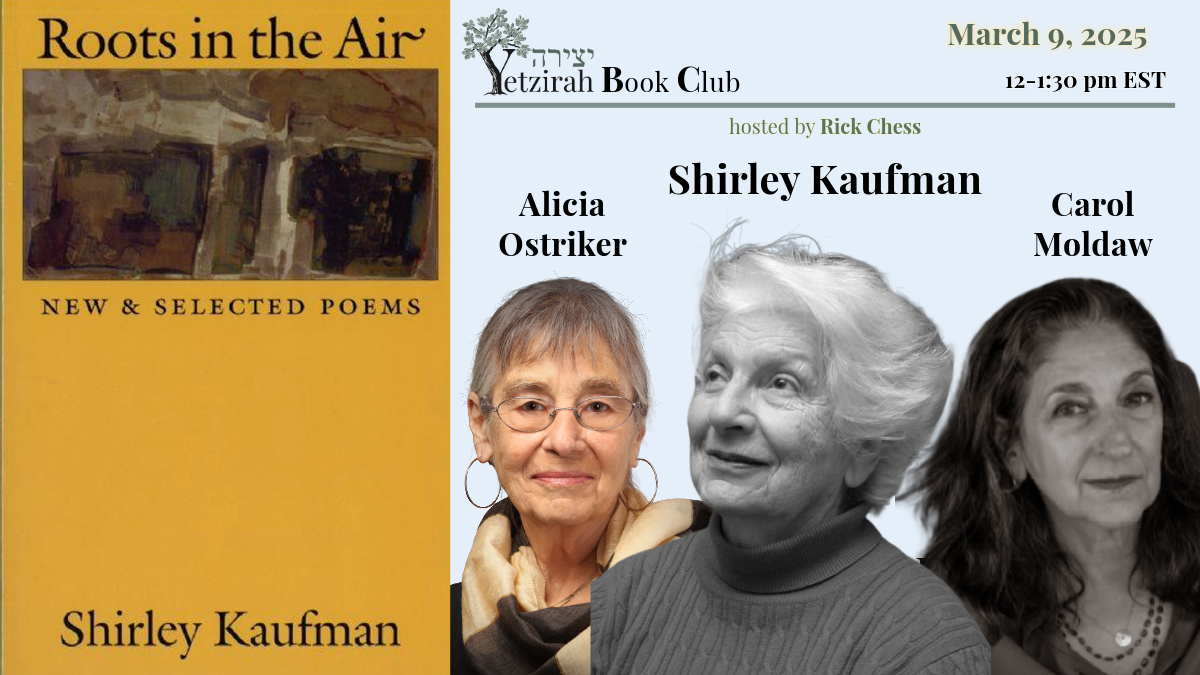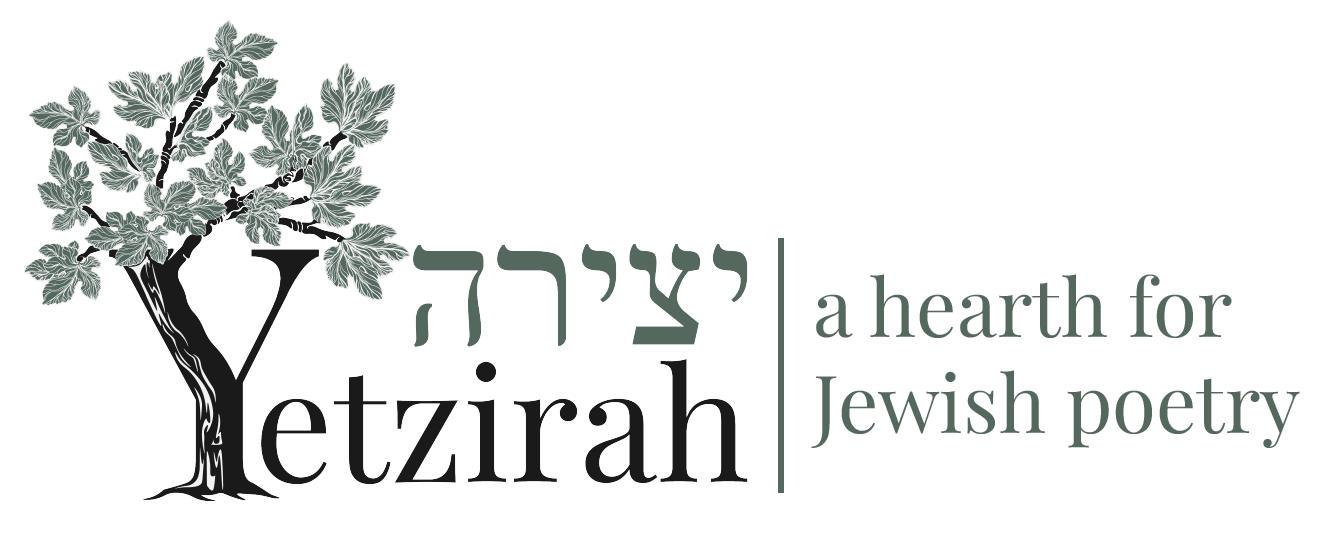
March 9: Book Club: Shirley Kaufman
Shirley Kaufman, Roots in the Air: New & Selected Poems
A reading and conversation with Alicia Ostriker, Carol Moldaw, and special guest Grace Schulman about the work of Shirley Kaufman. Hosted by Rick Chess.
American Israeli poet and translator Shirley Kaufman grew up in Seattle, the daughter of Polish immigrants. She earned a BA in English literature from UCLA and then pursued a career in advertising and raised a family. She was in her 40s when she started studying creative writing. She earned her MA at San Francisco State University, where she worked with Jack Gilbert, Kay Boyle, Robert Duncan, and John Logan. Kaufman moved to Israel in 1973, after marrying her second husband, Hillel Matthew Daleski.
Kaufman published numerous collections of poetry, including The Floor Keeps Turning (1970), Looking at Henry Moore’s Elephant Skull Etchings in Jerusalem During the War (1977), Roots in the Air: New & Selected Poems (1996), Threshold (2003), and Ezekiel’s Wheels (2009). Kaufman’s poems address mother-daughter relationships, immigrant identity, violence, intimacy, and history. Her move to Israel, where she experienced war firsthand and witnessed its aftermath, profoundly influenced her work. Kaufman’s translations include the poetry of the Israeli poets Abba Kovner: My Little Sister (1971), Scrolls of Fire (1978), and A Canopy in the Desert: Selected Poems (1973); Amir Gilboa: The Light of Lost Suns: Selected Poems (1979); and Meir Weiseltier: The Flower of Anarchy (2003). She translated from the Dutch, with poet Judith Herzberg, But What: Selected Poems of Judith Herzberg (1988). She also co-edited the bilingual anthology The Defiant Muse: Hebrew Feminist Poems from Antiquity to the Present (1994).
Among Kaufman’s awards are fellowships from the National Endowment for the Arts, the Shelley Memorial Award from the Poetry Society of America, the Alice Fay di Castagnola Award from the Poetry Society of America, and the Israeli President’s Prize for Literature. She died in the fall of 2016.
Alicia Ostriker, a poet and critic, has published nineteen volumes of poetry, including The Volcano and After (2020), Waiting for the Light (2017), which received the National Jewish Book Award, The Book of Seventy, which received that award in 2009, The Old Woman, the Tulip, and the Dog (2014), The Book of Life: Selected Jewish Poems 1979-2011; and No Heaven (2005). Her 1980 feminist classic and anti-war poem sequence, The Mother/Child Papers, was recently reprinted by the University of Pittsburgh Press. The Volcano Sequence, a volume of spiritual quest and questioning, wrestles with Jewish traditions. Twice a National Book Award Finalist, for The Little Space (1998) and The Crack in Everything (1996), and winner of the William Carlos Williams Award for The Imaginary Lover, Ostriker is known for her intelligence and passionate appraisal of women’s place in literature, and for investigating themes of family and sexuality, politics, religion, Jewish identity, and celebration of city life. Ostriker’s poetry is at once moving and new, because it touches old and deep knowledge, and also opens the heart and mind again. Or, as Joan Larkin puts it, “In a voice absolutely her own—wild, earthy, irreverent, full of humor and surprise—Ostriker takes on nothing less than what it feels like to be alive.”
Ostriker’s critical work includes the now-classic Stealing the Language: the Emergence of Women’s Poetry in America, and other books on American poetry from Walt Whitman to the present. She is also the author of critical books on the Bible, including the controversial The Nakedness of the Fathers: Biblical Visions and Revisions, a combination of midrash and autobiography. Her newest prose work is For The Love of God: the Bible as an Open Book, of which Elaine Pagels writes, “No one who reads this amazing, brilliantly written book will ever read the Bible the same way again. Her poetry has appeared in The New Yorker, American Poetry Review, The Atlantic, Paris Review, Yale Review, Ontario Review, The Nation, The New Republic, Best American Poetry, The Pushcart Anthology, and many other journals and anthologies, and has been translated into numerous languages including Hebrew and Arabic. Ostriker has performed her work widely in the USA, and has performed, lectured, and led workshops in England, France, Italy, Israel, Japan, and China. In 2015, Ostriker was appointed a Chancellor of the Academy of American Poets. In 2018, Everywoman Her Own Theology, a volume of essays on Ostriker’s poetry, was published by the University of Michigan Press. Ostriker lives in New York City, is Professor Emerita of English at Rutgers University and taught for ten years in the low-residency Poetry MFA program of Drew University. She says, “If I did not have teaching to do, I would not recognize myself.”
Carol Moldaw is a poet, essayist, and fiction writer. She is the author of seven books of poetry, most recently, Go Figure (Four Way Books, 2024), and one novella, The Widening (Etruscan Books, 2008). Her poetry collection The Lightning Field (Oberlin Press, 2002) won the 2002 FIELD Poetry Prize, and Through the Window (La Alameda Press, 2001) was translated into Turkish and published in a bi-lingual edition in Istanbul. A volume of her selected poems translated into Chinese is forthcoming from Guangxi Normal University Press (Beijing) in 2025. In 2022, Moldaw was an artist-in-residence at the Merwin Conservancy in Maui. She is also the recipient of a Lannan Foundation Marfa Writer’s Residency, an NEA Creative Writing Fellowship, and a Pushcart Prize, and her work is published widely in journals, including American Poetry Review, Georgia Review, Poetry, Subtropics, Virginia Quarterly Review, and The Yale Review. As noted in The New Yorker, Moldaw’s work “repeatedly achieves lyric junctures of shivering beauty.” About The Lightning Field, Frieda Gardner wrote in The Women’s Review of Books: “She courts revelation . . . in a voice variously curious, passionate, surprised, meditative, and sensual. On the surface of her work are rich sound and variation of rhythm and line. A few steps deeper in lie wells of feeling and complexities of thought.” From 2005-2008 Moldaw was on the faculty of Stonecoast, the University of Southern Maine’s low-residency M.F.A. program, and she has been a recurrent Visiting Writer at the Vermont Studio Center, taught at the College of Santa Fe and in the MFA program at Naropa University. In the spring of 2011, she served as the Louis D. Rubin, Jr., Writer-in-Residence at Hollins University. Currently, she lives in Santa Fe, New Mexico, and teaches privately. A complete list of her books can be found at www.carolmoldaw.com.
Grace Schulman is a member of The American Academy of Arts and Letters, which is considered “the highest form of recognition of artistic merit in this country.” She is also the recipient of the Frost Medal for Distinguished Lifetime Achievement in American Poetry, awarded by the Poetry Society of America. Her ninth book of poems is Again, the Dawn: New and Selected Poems, 1976–2022, appearing in November, 2022. Her other recent books of poems include The Marble Bed and Without a Claim. She is the author of a memoir, Strange Paradise: Portrait of a Marriage, and an essay collection, First Loves and Other Adventures. Editor of The Poems of Marianne Moore, she is Distinguished Professor of English at Baruch College, C.U.N.Y. Among her other honors are the Aiken Taylor Award for poetry, a Guggenheim Fellowship, the Delmore Schwartz Memorial Award, five Pushcart Prizes., and has been featured seven times on Poetry Daily. She is the translator, from the Hebrew, of The Poems of T. Carmi, and, from the Spanish, of Songs of Cifar, by Pablo Antonio Cuadra. About her poems, Harold Bloom has written, “Grace Schulman has developed into one of the permanent poets of her generation.” Schulman is former director of the Poetry Center, 92nd Street Y, 1974-84, and former poetry editor of The Nation, 1971-2006.
